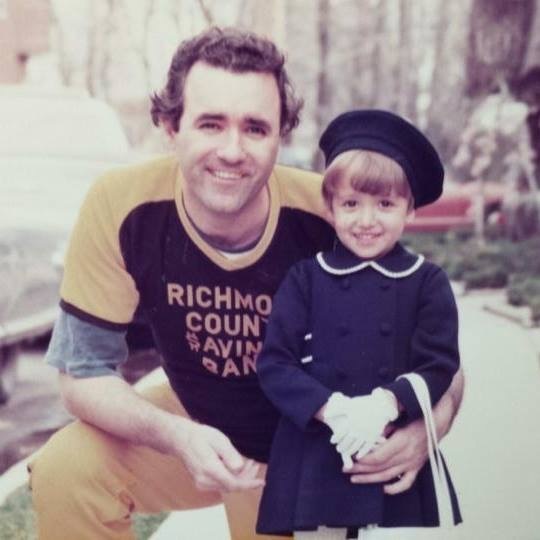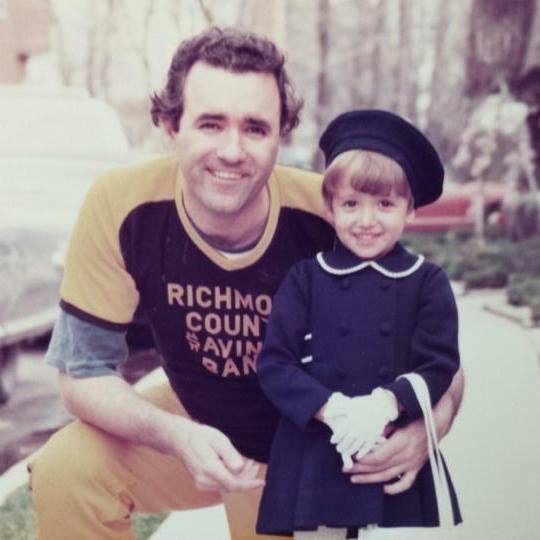
I wasn’t prepared for the impact of my father’s cancer. The story of my father’s cancer is now our family story. Our story begins when my father was diagnosed with Stage IV base of the tongue cancer and continues even now that he is gone. It is a story I continue to tell, so that other families have the knowledge and the power to help each other.
Our story is a seven year journey of my father living with chronic pain, losing his ability to eat and drink, spending the last four years of his life surviving solely on a peg tube with severe nerve damage. Nerve damage so severe that his entire body would twitch and nothing could help him, nothing could alleviate his pain. Nerve damage so severe I would walk into my parent’s home and hear my father screaming in pain rendering us all helpless. Nerve damage so severe that my father was housebound the last two years of his life, missing countless family moments.
My mother was my father’s primary caregiver throughout his entire illness, and she did this with unconditional love, dignity and grace. If love could have saved my father he would be here right now. Even as I am writing this, I am not sure how my mother was my father’s sole caregiver for so long. My mother is the definition of strength and courage while surrounded by heartbreak and human suffering.
Although my father had a strong faith and a great attitude, the effects from his treatments could not be stopped. Slowly cancer stole pieces of my father until he was no longer able to do the most basic tasks. Eventually my parents needed help and the reality was terrifying. For my father and the rest of the family it was difficult to admit that outside help was something we needed. Unfortunately families like mine, families in need of prolonged healthcare face a dilemma. They either have to be poor enough to qualify for Medicaid or rich enough to pay the costs alone. Paying roughly $80,000 out of pocket, the average annual cost for a shared room at a skilled nursing facility, was something our family could not afford. My father spent his entire life working and saving, a nursing home would have wiped my parents out.
My father was on hospice the last four months of his life. Hospice for my Dad was someone coming to the home a few hours during the day to check on him. But the need for care was at night when my mother desperately needed rest. As my father’s health continued to decline, he fell one evening while my parents were alone; his peg tube came out twice. Each time hospice was called and a nurse came rushing to the home in the middle of the night.
I am not writing this saying my father should have been put into a nursing home – at that stage of my father’s illness my parents did not want that. However, the reality of a live-in aide or just having care come in for longer stays was desperately needed.
There are ways to alleviate the incredible costs of long term care. There are ways to plan for long term care. Our family never thought we would need to think of the unthinkable, one minute my father was newly retired ready to enjoy golf and vacations with my mother and the next he was diagnosed with cancer. We naively thought after a few radiation treatments, he would be fine. We were wrong. My father’s radiation treatments slowly robbed him of quality of life, eventually leaving him dependent on my mother. It was a heartbreaking journey, but one that needs to be told so that other families are aware that they have options.
Being prepared for the role of a caregiver means taking numerous different factors into consideration. You need to ask yourself hard questions about how your availability and care-giving capabilities will affect your ability to provide effective care for the patient AND yourself.
- Am I financially prepared for the extra costs of caregiving?
- Am I really capable of taking care of my loved one all by myself? Do I need to hire outside help or consider assisted living?
- Do I have the resources I’m going to need?
- How will caregiving affect my physical and mental health?
- Will I be able to cut back on work responsibilities during those times when I need to care for my parent?
The life of a caregiver is not easy. I watched my mother selflessly care for my father. She spent numerous sleepless nights fearful that my very weak father would fall if he needed to get up and use the bathroom. Her days would be spent caring for my very sick, frail father. Although he had hospice care the last 4 months of his life, that was only for a few hours during the week. It was my mother who was my father’s primary caregiver. It was my mother who dedicated her life to taking care of my father.
Millions of U.S. families will face the same reality my family faced. When your loved one needs long term care how will you pay for it? It’s a reality that we should consider and plan for.
Originally published at mrzenithspeaks.com


